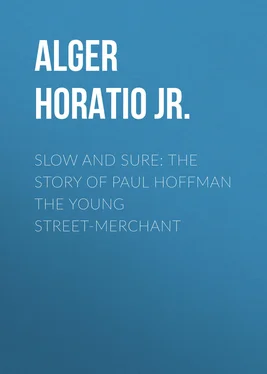Horatio Alger - Slow and Sure - The Story of Paul Hoffman the Young Street-Merchant
Здесь есть возможность читать онлайн «Horatio Alger - Slow and Sure - The Story of Paul Hoffman the Young Street-Merchant» — ознакомительный отрывок электронной книги совершенно бесплатно, а после прочтения отрывка купить полную версию. В некоторых случаях можно слушать аудио, скачать через торрент в формате fb2 и присутствует краткое содержание. Жанр: foreign_children, literature_19, foreign_antique, foreign_prose, на английском языке. Описание произведения, (предисловие) а так же отзывы посетителей доступны на портале библиотеки ЛибКат.
- Название:Slow and Sure: The Story of Paul Hoffman the Young Street-Merchant
- Автор:
- Жанр:
- Год:неизвестен
- ISBN:нет данных
- Рейтинг книги:5 / 5. Голосов: 1
-
Избранное:Добавить в избранное
- Отзывы:
-
Ваша оценка:
- 100
- 1
- 2
- 3
- 4
- 5
Slow and Sure: The Story of Paul Hoffman the Young Street-Merchant: краткое содержание, описание и аннотация
Предлагаем к чтению аннотацию, описание, краткое содержание или предисловие (зависит от того, что написал сам автор книги «Slow and Sure: The Story of Paul Hoffman the Young Street-Merchant»). Если вы не нашли необходимую информацию о книге — напишите в комментариях, мы постараемся отыскать её.
Slow and Sure: The Story of Paul Hoffman the Young Street-Merchant — читать онлайн ознакомительный отрывок
Ниже представлен текст книги, разбитый по страницам. Система сохранения места последней прочитанной страницы, позволяет с удобством читать онлайн бесплатно книгу «Slow and Sure: The Story of Paul Hoffman the Young Street-Merchant», без необходимости каждый раз заново искать на чём Вы остановились. Поставьте закладку, и сможете в любой момент перейти на страницу, на которой закончили чтение.
Интервал:
Закладка:
Both laughed heartily over the eccentricities of Topsy, probably the most original character in Mrs. Stowe's popular story, and Jimmy was affected to tears at the death of little Eva. To his unaccustomed eyes it seemed real, and he felt as if Eva was really dying. But, taking it altogether, it was an afternoon of great enjoyment to Jimmy, whose pleasures were not many.
"Well, Jimmy, how did you like it?" asked Paul, as they were working their way out slowly through the crowd.
"It was beautiful, Paul. I am so much obliged to you for taking me."
"I am glad you liked it, Jimmy. We will go again some time."
They were stepping out on the sidewalk, when a boy about Paul's size jostled them rudely.
"There's Limpy!" said he, with a rude laugh.
"You'd better not say that again, Peter Blake," he said menacingly.
"Why not?" demanded Peter defiantly.
"It won't be safe," said Paul significantly.
"I'll call you Limpy if I like."
"You may call me so, and I won't mind it. But don't you call my little brother names."
"I don't mind, Paul," said Jimmy.
"But I do," said Paul. "No boy shall call you names when I am near."
Paul's resolute character was well understood by all the boys who knew him, and Peter would not have ventured to speak as he did, but he did not at first perceive that Jimmy was accompanied by his brother. When he did discover it he slunk away as soon as he could.
They were walking up Park Row, when Jim Parker, once an enemy, but now a friend of Paul, met them. He looked excited, and hurried up to meet them.
"When were you home, Paul?" he asked abruptly.
"Two or three hours since. I have just come from Barnum's."
"Then you don't know what's happened?"
Paul turned instantly.
"No. What is it?"
"Your house has caught fire, and is burning down. The engines are there, but I don't think they can save it."
"Let us hurry home, brother," said Paul. "It's lucky I've got my bank-book with me, so if we are burned out, we can get another home at once."
Excited by this startling intelligence, they quickened their steps, and soon stood in front of the burning building.
CHAPTER III.
THE BURNING OF THE TENEMENT HOUSE
The scene was an exciting one. The occupants of the large tenement house had vacated their rooms in alarm, each bearing what first came to hand, and reinforced by a numerous crowd of outsiders, were gazing in dismay at the sudden conflagration which threatened to make them homeless.
"Och hone! och hone! that iver I should see the day!" exclaimed a poor Irish woman, wringing her hands. "It's ruined intirely I am by the fire. Is that you, Mrs. Hoffman, and Paul? Indade it's a sad day for the likes of us."
"It is indeed, Mrs. McGowan. Do you know how the fire caught?"
"It's all along of that drunken brute, Jim O'Connel. He was smokin' in bed, bad luck to him, as drunk as a baste, and the burnin' tobacker fell out on the shates, and set the bed on fire."
"Cheer up, Mrs. McGowan!" said the hearty voice of Mrs. Donovan. "We ain't burnt up ourselves, and that's a comfort."
"I've lost all my money," said Mrs. McGowan disconsolately. "I had twenty-siven dollars and thirty cents in the bank, and the bank-book's burnt up, och hone!"
"You can get your money for all that, Mrs. McGowan," said Paul. "Just tell them at the savings-bank how you lost your book, and they will give you another."
"Do you think so?" asked Mrs. McGowan doubtfully.
"I feel sure of it."
"Then that's something," said she, looking considerably relieved. "Whin can I get it?"
"I will go with you to the bank to-morrow."
"Thank you, Paul. And it's you that's a fine lad intirely."
"All my pictures will burn up," said Jimmy.
"You can draw some new ones," said Paul. "I am afraid, mother, you will never wear that new dress of yours."
"It's a pity I bought it just at this time."
"Here's a bundle I took from your room, Mrs. Hoffman," said a boy, pushing his way through the crowd.
"My dress is safe, after all," said Mrs. Hoffman in surprise. "It is the only thing we shall save."
"You can have it made up and wear it in remembrance of the fire, mother."
"I shall be likely to remember that without."
Meanwhile the fire department were working energetically to put out the fire. Stream after stream was directed against the burning building, but the fire had gained too great headway. It kept on its victorious course, triumphantly baffling all the attempts that were made to extinguish it. Then efforts were made to prevent its spreading to the neighboring buildings, and these were successful. But the building itself, old and rotten, a very tinderbox, was doomed. In less than an hour the great building, full as a hive of occupants, was a confused mass of smoking ruins. And still the poor people hovered around in uncertainty and dismay, in that peculiarly forlorn condition of mind induced by the thought that they knew not where they should lay their heads during the coming night. One family had saved only a teakettle to commence their housekeeping with. A little girl had pressed close to her breast a shapeless and dirty rag baby, her most valued possession. A boy of twelve had saved a well-used pair of skates, for which he had traded the day before, while an old woman, blear-eyed and wrinkled, hobbled about, groaning, holding in one hand a looking-glass, an article the most unlikely of all, one would think, to be of use to her.
"Did you save nothing, Mrs. Donovan?" asked Paul.
"Shure and I saved my flatirons, and my tub I threw out of the window, but some spalpeen has walked off with it. I wish it had fallen on his head. What'll my Pat say when he comes home from work?"
"It's lucky no lives were lost."
"Thrue for you, Mrs. Hoffman. It might have been a dale worse. I don't mind meself, for I've strong arms, and I'll soon be on my fate again. But my Pat'll be ravin'. He had just bought a new coat to go to a ball wid tomorrow night, and it's all burnt up in the fire. Do you see that poor craythur wid the lookin' glass? I'm glad I didn't save mine, for I wouldn't know what to do wid it."
"Well, Mrs. Donovan, we must find a new home."
"I've got a sister livin' in Mulberry street. She'll take me in till I can get time to turn round. But I must stay here till my Pat comes home, or he would think I was burnt up too."
The crowd gradually diminished. Every family, however poor, had some relations or acquaintances who were willing to give them a temporary shelter, though in most cases it fed to most uncomfortable crowding. But the poor know how to sympathize with the poor, and cheerfully bore the discomfort for the sake of alleviating the misfortune which might some day come upon themselves.
"Where shall we go, mother?" asked Jimmy anxiously.
Mrs. Hoffman looked doubtfully at Paul.
"I suppose we must seek shelter somewhere," she said.
"How will the Fifth Avenue Hotel suit you?" asked Paul.
"I think I will wait till my new dress is finished," she said, smiling faintly.
"Why, what's the matter, Paul? You're not burnt out, are you?"
Turning at the voice, Paul recognized Sam Norton, a newsboy, who sold papers near his own stand.
"Just about so, Sam," he answered. "We're turned into the street."
"And where are you going to stop over night?"
"That's more than I know. Mother here isn't sure whether she prefers the St Nicholas or Fifth Avenue."
"Paul likes to joke at my expense," said Mrs. Hoffman.
"Come over and stop with us to-night," said Sam. "My mother'll be glad to have you."
"Thank you, Sam," said Mrs. Hoffman, who knew the boy as a friend of Paul, "but I shouldn't like to trouble your mother."
"It'll be no trouble," said Sam eagerly.
Читать дальшеИнтервал:
Закладка:
Похожие книги на «Slow and Sure: The Story of Paul Hoffman the Young Street-Merchant»
Представляем Вашему вниманию похожие книги на «Slow and Sure: The Story of Paul Hoffman the Young Street-Merchant» списком для выбора. Мы отобрали схожую по названию и смыслу литературу в надежде предоставить читателям больше вариантов отыскать новые, интересные, ещё непрочитанные произведения.
Обсуждение, отзывы о книге «Slow and Sure: The Story of Paul Hoffman the Young Street-Merchant» и просто собственные мнения читателей. Оставьте ваши комментарии, напишите, что Вы думаете о произведении, его смысле или главных героях. Укажите что конкретно понравилось, а что нет, и почему Вы так считаете.












